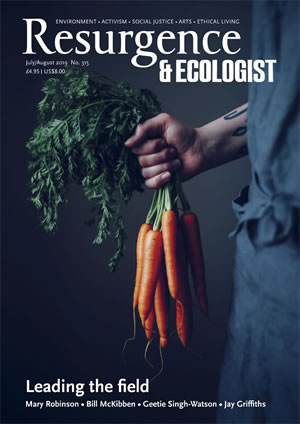In The Enchanted Life, Sharon Blackie has written a sort of treatise on finding wonder in the everyday versus living a half-life of grim, numb disconnection. She stresses that for her, enchantment is about being very present in the world and has nothing to do with what she calls “magical thinking”, i.e. believing you can make things happen through wishful thinking and living entirely in your head. To live an enchanted life, she writes, is “to pick up the pieces of our bruised and battered psyches, and to offer them the nourishment they long for. It is to be challenged, to be awakened, to be gripped and shaken to the core by the extraordinary which lies at the heart of the ordinary.”
So, how can you make this happen? And what are you to do if you’ve been beaten into submission by your upbringing or by the dominant prevailing narratives of our culture, which have entirely demystified and flattened our perception of the world and our place in it? The author addresses such things in her serious way, which means this most definitely is not a light or fast read. A psychologist by training, with a PhD in neuroscience – Blackie now describes herself as a teacher and writer and operates in what she calls the “interface of psychology, mythology and ecology” – her tone is academic and the book is heavily referenced.
Resurgence & Ecologist readers unfamiliar with her work or her previous book If Women Rose Rooted will be glad to know that for Blackie the landscape is very much alive and full of spirit. She talks about panpsychism, the idea of the world having a soul, or as she puts it, “an interior, subjective reality”, and is concerned with how we might re-engage with this soulfulness in every aspect of life. To this end, her book offers tips that illustrate how to go about breaking through the surface, autopilot mode and experiencing connection, not just in Nature, but also in the homestead, in the kitchen, and in community, whether we live in the suburbs, the city, or indeed a remote, rural wild place.
It is her lyrical anecdotes and personal stories that I warm to most and that bring the book alive for me. The author’s account of trying Watsu, a form of aquatic bodywork, in a retreat centre in Missouri, and finding her lifelong feeling of ‘otherness’ dissolving whilst being cradled in the water is moving, both for the transformation we are privy to, and because we learn what it is that has led her to this place. Equally, the chapter in which she writes of learning to feel at home in her skin while living on the Isle of Lewis in a “croft at the end of the world” that is regularly battered by gales is compelling. There is no escape from the tenacious, fractious winds, but eventually she comes to redefine her relationship with the Hebridean weather and with life itself: “I understood now that I inhabited this living biosphere – that I was a living being, living inside the body of another living being… The way that I imagined the world, and my place in it, underwent a radical shift of perspective …”
Towards the end, the story of a friend who has a special ability to connect with horses is a way of illustrating kinship with the ‘other’. Blackie’s scientific training means she is at pains to make clear there is no ‘woo woo’ here – revealing in itself. Part memoir, part practical guide, part philosophical discourse, The Enchanted Life is ambitious and well researched. A book for dipping into – and for returning to as well.







